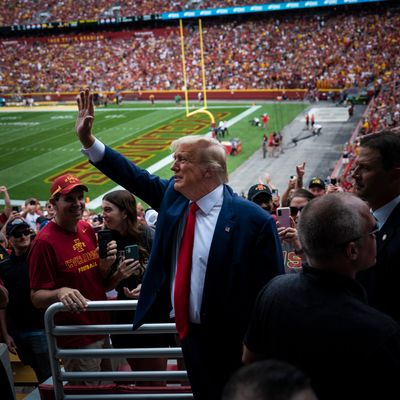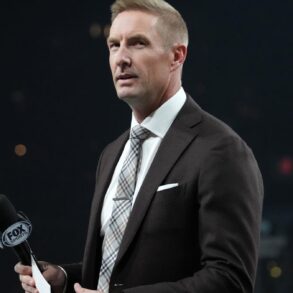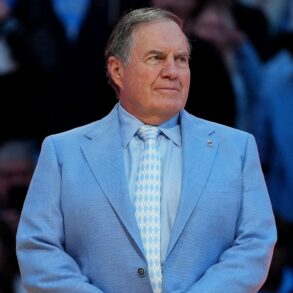
Coach Trump at a college-football game.
Photo: Jabin Botsford/The Washington Post via Getty Im
As most college-football fans have repeatedly heard, their sport is broken. In 2021, the U.S. Supreme Court finally put an end to the involuntary servitude of student athletes that created a vast treasure chest of wealth for their schools and coaches while only a small portion was kicked back to some of them via illegal under-the-table payments — a rather blatant violation of antitrust laws. College football (along with other collegiate sports) is in a wild-West era: Colleges compete for players, who can transfer repeatedly in pursuit of the best deal, financially and otherwise. This player-friendly situation has massively offended football traditionalists and exposed the fecklessness of the National Collegiate Athletic Association, the sport’s alleged governing authority. It’s also arguably unsustainable, thanks to the instability it has introduced into college-football rosters and conferences in a sport where competitive balance is important.
The obvious solution (modeled by professional sports teams) is to recognize players as employees and let them bargain collectively for pay and benefits, which would create enforceable labor contracts and bring order and predictability. But the same traditionalists who deplore the loss of student-athlete serfdom hate this idea, in part because it means abandoning the hoary myth of college athletics amateurism, and also because they tend to be crusty old reactionary men who would just as soon ban unions everywhere. So their preferred “solution” for the “crisis” in college football is to get an antitrust exemption from Congress that allows schools and conferences to reimpose at least some of the recently abolished shackles on player compensation and movement. Congress, of course, is reluctant to wade into this legal, financial, and cultural morass, and no filibuster-proof formula is evident either. Thus, inevitably, traditionalists have turned their lonely eyes to someone who is forever pleased to seize power and “fix” things: the 47th president of the United States.
Last week, after introducing Donald Trump as commencement speaker at the University of Alabama, where he was until last year the all-powerful and all-dominant football coach, Nick Saban bluntly asked the fixer-in-chief to intervene, as The Wall Street Journal reported:
The Trump administration is considering an executive order that could increase scrutiny of the explosion in payments to college athletes since 2021, after the president met with former Alabama coach Nick Saban, White House officials said.
Trump met with Saban on Thursday night when he was in Tuscaloosa to deliver the University of Alabama’s commencement address. Saban talked about “NIL” deals with Trump, telling the president how he believed the influx of money had damaged college sports.
“NIL” stands for “name, image and likeness,” but is used as a catchall term for the new era in which college athletes are allowed to earn money from their fame.
Since the crux of the matter is CFB’s ongoing, blatant violation of congressionally established antitrust laws, it’s unclear how an executive order could be relevant at all. But as we know very well by now, Trump isn’t inhibited by laws or constitutional provisions that limit his power. Some legal observers, like Sportico’s Michael McCann, are concerned that an executive order would create more, not less, chaos:
Any executive order that restricts athletes, schools, conferences or the NCAA would encounter a bevy of problems since it would interact, and possibly conflict, with multiple areas of federal and state laws …
There are also potential constitutional problems with a Trump executive order on college sports. It could run afoul of Equal Protection if college athletes are denied the same rights, including for employment and other economic opportunities, that their classmates enjoy. An executive order might also run afoul of the First Amendment to the extent it limits how college athletes express themselves.
A Trump intervention could also create yet another direct collision with the federal judiciary, insofar as district court judge Claudia Wilken is on the brink of finalizing a $2.8 billion antitrust settlement that will let schools use TV revenue to directly compensate athletes in addition to the NIL money they now bargain to receive. You can definitely and reliably imagine that college football’s old-school faction hopes Trump throws a big monkey wrench into the wheels of justice.
If the legal and financial complexity of the situation doesn’t faze Trump, he might also be motivated to intervene by some inflated notion of his own sporty expertise. He did, after all, once own a pro-football franchise for two seasons in the upstart United States Football League. But let’s recall how it ended: in a huge antitrust lawsuit against the NFL, which he won but which yielded a $3 jury reward that doomed the USFL to extinction. If he brings that sort of success to college football, traditionalists may learn there are far worse outcomes to the current crisis than unionization.
This post was originally published on this site be sure to check out more of their content.






